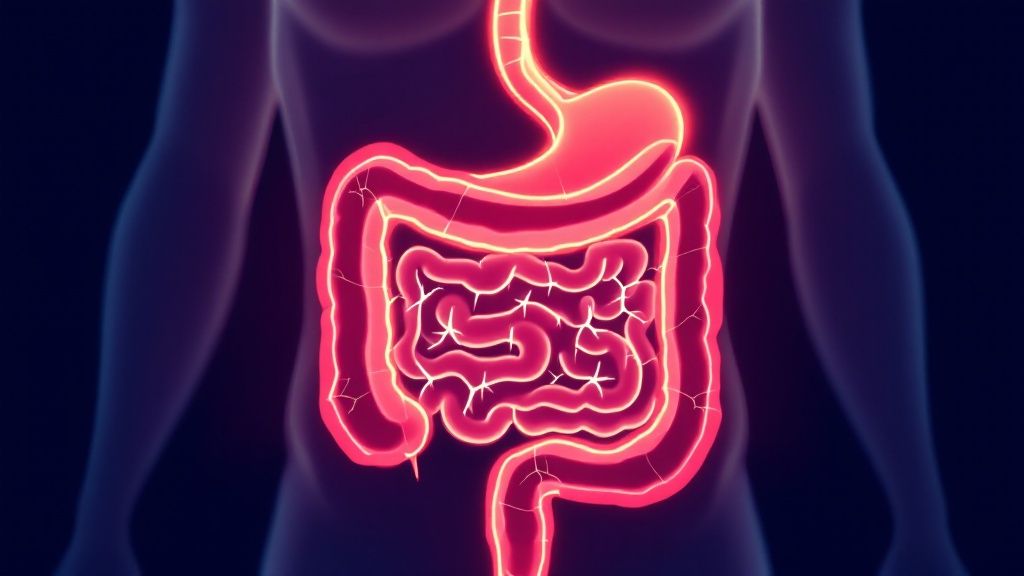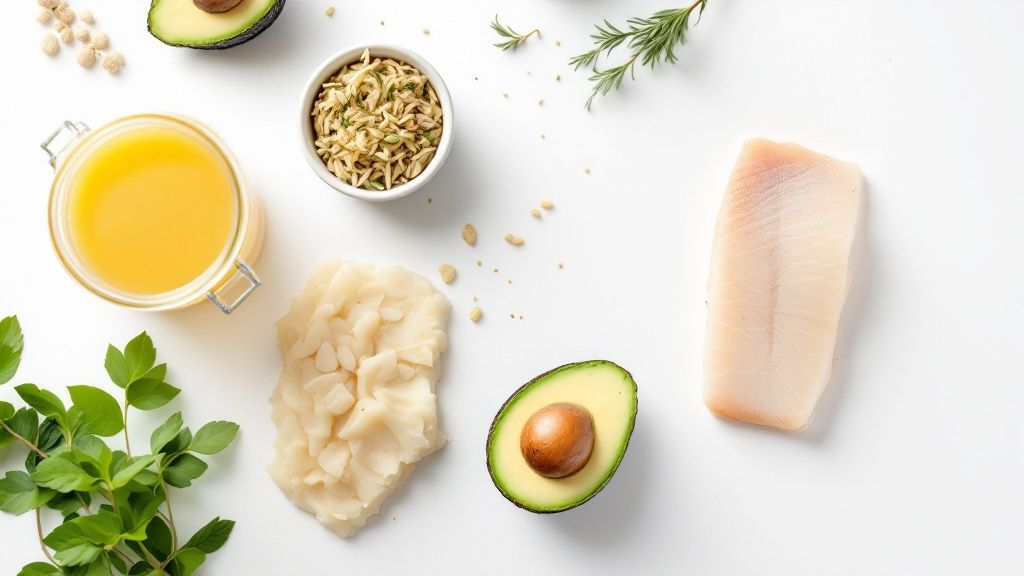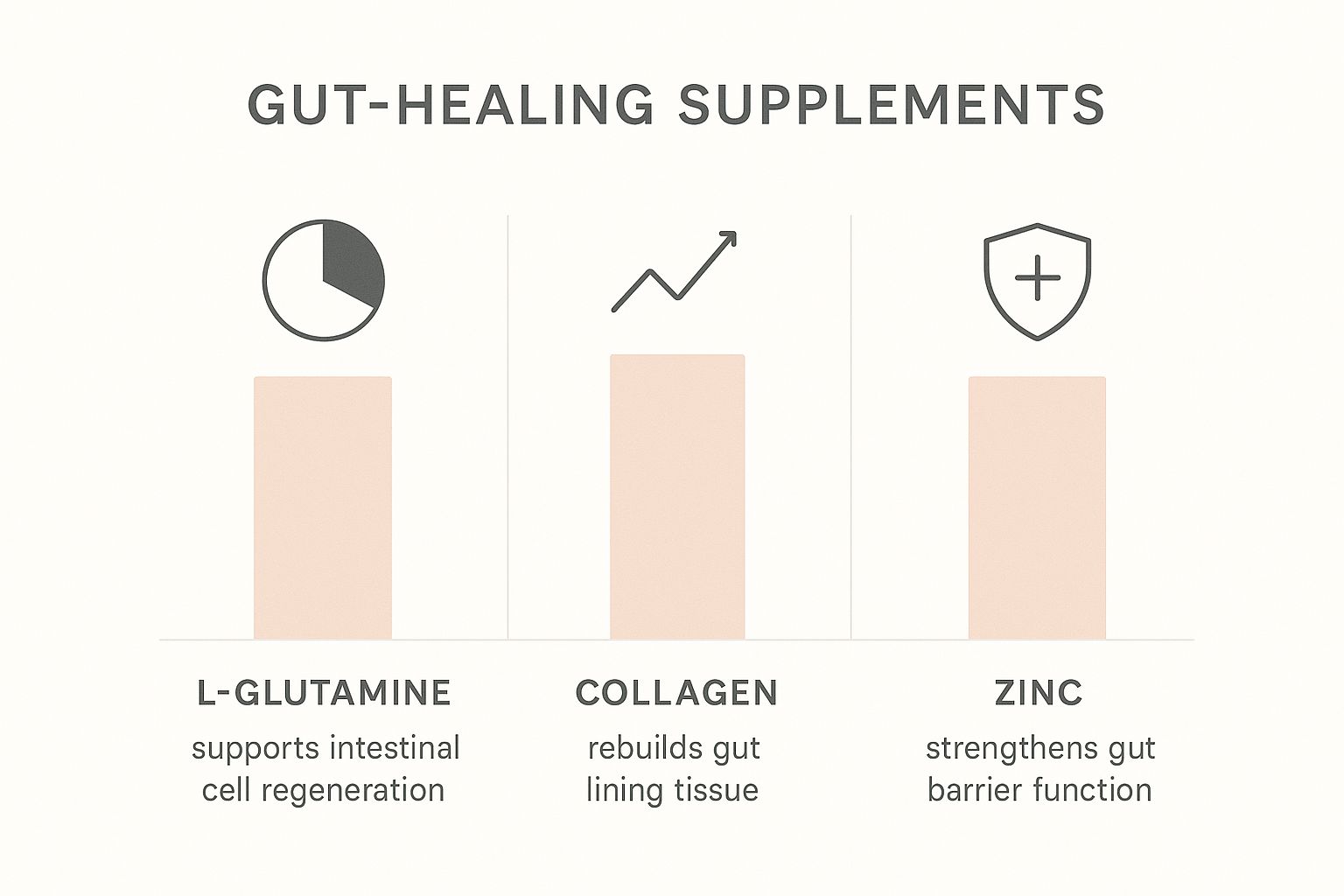How to Heal Leaky Gut (and Finally Feel Better)
Ever feel like your stomach inflates like a balloon by afternoon? You’re not alone- and it’s not just what you ate for lunch. If you’re dealing with that sense that your digestion is just… off, the persistent bloating, frustrating brain fog, or food sensitivities that pop up out of nowhere, you're in the right place. We get it, and we're here to help you figure it out.
Let’s break down what’s happening in a way that actually makes sense. Think of your gut lining as a highly selective bouncer at an exclusive club. Its job is to let the good guys- properly digested nutrients, vitamins, and minerals- pass into your bloodstream while keeping the troublemakers out.
But when things like stress, a not-so-great diet, or environmental toxins cause inflammation, tiny gaps can form in that protective wall. This is what scientists call increased intestinal permeability, but you might know it by its more common name: leaky gut.
Suddenly, the bouncer is asleep on the job. Undigested food particles, nasty bacteria, and toxins can sneak through these gaps and enter your bloodstream, where they have no business being. Your immune system, doing its job, spots these invaders and goes on high alert, triggering a wave of inflammation that can ripple throughout your entire body.
Recognizing the Signs
The tricky thing about a compromised gut is that the signs aren't always confined to your stomach. Since the resulting inflammation is systemic, it can manifest in ways you might not expect.
Before we dive into how to heal leaky gut, it’s helpful to connect the dots between what you’re feeling and what might be happening inside. Many people live with these symptoms for years without realizing they all point back to gut health.
| Common Signs Your Gut May Need Support |
| :--- | :--- | :--- |
| Symptom Category | Common Examples | What It Might Feel Like |
| Digestive Issues | Chronic bloating, gas, diarrhea, constipation, or indigestion. | "I feel like I'm constantly bloated, no matter what I eat." |
| Food Sensitivities | New reactions to foods like gluten, dairy, or corn. | "I used to eat bread all the time, but now it makes me feel terrible." |
| Brain & Mood | Brain fog, difficulty concentrating, anxiety, or fatigue. | "I feel exhausted all the time, even after a full night's sleep." |
| Skin Problems | Eczema, acne, psoriasis, or unexplained rashes. | "My skin keeps breaking out, and nothing I do seems to help." |
| Joint & Muscle Pain | Unexplained aches, stiffness, or soreness in your joints. | "My joints ache, but I haven't injured myself." |
Seeing your own experiences in this table can be a real lightbulb moment. It’s the first step toward understanding the root cause instead of just chasing symptoms. It’s frustrating, we know, but it’s also the beginning of taking your power back.
If these signs are hitting close to home, it's worth taking a deeper look. Piecing the puzzle together is key, and you can explore more about these connections in our guide to the signs of an unhealthy gut.
The Science Corner: It's Real, Not Just a Trend
Now, you won't find "leaky gut syndrome" listed as an official medical diagnosis. However, the underlying mechanism- intestinal permeability- is a well-documented scientific concept.
Researchers have established clear links between a compromised gut barrier and conditions like Celiac disease, Crohn's disease, and irritable bowel syndrome (IBS). A 2024 review published in Nature even calls it a "central player" in many health issues. This isn't just a wellness trend; it's a fundamental aspect of our health that science is finally catching up to.
What this means for you: A healthy gut wall is absolutely critical for your overall well-being. When it's compromised, the effects can be felt far beyond your digestive system.
This isn't about a magic pill or a quick fix. It's about giving your body the tools it needs to heal itself from the inside out. To do that, we’ll walk through a proven 4-R framework: Remove, Replace, Reinoculate, and Repair. It’s a clear, actionable roadmap to help you take back control of your health. Let’s get started.
Step 1: Remove Triggers to Calm Your System

The first, and honestly most empowering, step in healing your gut is figuring out what’s causing the irritation in the first place. Think of it like this: if your gut is overworked and inflamed, the kindest thing you can do is give it a break. That’s what this "Remove" phase is all about.
This isn't about creating a restrictive, joyless diet. I promise. It’s more like becoming a detective for your own body. We’re going to gently press pause on a few common culprits to see how you really feel without them. It’s a temporary experiment to give your gut the space it needs to finally start healing.
Identifying Your Dietary Triggers
Our primary mission here is to lower inflammation. Certain foods, even seemingly healthy ones, can be really tough on a compromised gut lining. By taking them out of the rotation for a little while, we’re essentially turning down the inflammatory "noise" so your body’s natural repair crew can get to work.
Here are the main players we suggest looking at first:
- Gluten: This isn't just a trend. I do NOT think everyone needs to be gluten-free forever, but the protein in wheat, barley, and rye can be genuinely hard for many to digest. It can prompt the release of a protein called zonulin, which has been shown to directly loosen the tight junctions in your intestinal wall.
- Dairy: For many people, lactose (milk sugar) and casein (a milk protein) are major sources of irritation. If you lack enough of the lactase enzyme to break down lactose, you’re left with that classic- dun, dun, dun- unwelcome gas and bloating. Yikes!
- Processed Sugars: I’m talking about the high-fructose corn syrup and refined white sugar found in so many packaged foods. These are like junk food for the unhelpful bacteria in your gut, fueling an imbalance (dysbiosis) and fanning the flames of inflammation.
- Industrial Seed Oils: Highly processed oils like canola, soy, and corn oil are loaded with omega-6 fatty acids. When their intake isn't balanced by anti-inflammatory omega-3s, they can contribute to a state of chronic inflammation in the body.
This is all about making simple, intelligent swaps. Instead of refined sugar, try a little bit of pure maple syrup. Ditch the industrial seed oils for healing fats like avocado oil, coconut oil, or a quality extra virgin olive oil. See? It's an upgrade, not a sacrifice.
Beyond the Plate: Lifestyle Triggers
While your diet is a huge piece of the puzzle, it’s not the whole story. The way we live day-to-day has a massive impact on our gut health, and two of the biggest non-food triggers are chronic stress and certain common medications.
Ever felt "butterflies" in your stomach when you were nervous? That’s your gut-brain axis in real-time. Your gut and brain are in constant communication. When you’re chronically stressed, your brain sends out alarm signals that can mess with how food moves through your stomach and intestines, spike inflammation, and even weaken your gut barrier over time.
Sam’s Story: Our founder, Sam, dealt with digestive issues for years that no diet seemed to touch. The real breakthrough came when he finally connected the dots between his high-stress job and his symptoms. He realized that calming his mind was just as critical as calming his stomach. It was a small win that changed everything.
On top of that, frequent use of NSAIDs (nonsteroidal anti-inflammatory drugs) like ibuprofen can directly damage the gut lining. While they're useful for a one-off headache, relying on them daily can be a major hidden contributor to gut permeability.
Quick Wins: Smart Swaps for a Happier Gut
Making these kinds of changes can feel like a lot at once, so let's break it down into practical, easy-to-manage swaps you can start making today.
| Instead Of... | Try This... | Why It Helps |
|---|---|---|
| Regular Pasta | Gluten-Free Pasta (from rice or chickpeas) | Reduces exposure to gluten, a common irritant that can compromise the gut lining. |
| Cow's Milk | Unsweetened Almond or Coconut Milk | Avoids lactose and casein, which are frequent culprits behind bloating and discomfort. |
| White Sugar | Maple Syrup or Coconut Sugar (in moderation) | These are less refined, helping to starve the 'bad' gut microbes that thrive on sugar. |
| Canola Oil | Avocado Oil or Extra Virgin Olive Oil | Provides anti-inflammatory fats, unlike the pro-inflammatory nature of processed seed oils. |
Beyond these common triggers, just being mindful of food quality is crucial. For example, understanding the risks and prevention of eating moldy food is a simple but important way to avoid introducing toxins that can further disrupt your system.
Remember, this "Remove" phase isn't forever. It's your chance to give your body a clean slate and truly listen to what it needs to feel vibrant and energized from the inside out.
Step 2: Replace & Repair Your Gut Lining from the Ground Up

Alright, you’ve done the hard work of clearing out the troublemakers. Now for the satisfying part: rebuilding. Once you’ve removed the major irritants, your gut can finally get some breathing room. This phase is all about giving your body the specific tools and nutrients it needs to not just function better but to actively repair the damage.
We’re tackling two crucial steps at once here: Replacing what’s missing and Repairing what’s broken. Why together? Because they’re a team. You can eat all the healing foods in the world, but if your body can't break them down properly, you’re not getting the full benefit. It’s a one-two punch for real, lasting healing.
First, Replace What's Missing for Better Digestion
When your gut has been under chronic stress, its ability to produce enough digestive enzymes often takes a nosedive. Think of these enzymes as tiny helpers that break your food into microscopic pieces, unlocking all the vitamins and minerals inside.
Without enough of them, even a super healthy meal can lead to that all-too-familiar bloating, gas, and discomfort. This is where strategic replacement becomes a total game-changer. You’re essentially giving your digestive system a helping hand, which eases its workload so it can finally focus on healing itself.
This is exactly why Yuve Vegan Papaya Enzymes are an essential part of a gut-healing toolkit. The enzymes from papaya and pineapple- papain and bromelain- are fantastic at breaking down proteins that can otherwise be really tough on a sensitive system.
Taking enzymes before a meal is like sending in a support crew. It’s a smart, proactive step to ensure every bite nourishes your body efficiently, reducing strain and helping you get the maximum benefit from your healthy food choices.
Then, Repair the Gut Wall with Powerhouse Nutrients
With your digestive support in place, it’s time to send in the construction crew. Repairing the gut lining means providing the specific building blocks your intestinal cells need to regenerate and form those strong, tight junctions we talked about earlier.
Think of it like patching up a hole in a wall. You need the right materials- spackle, paint, and tools- to make it solid again. For your gut, those materials are specific amino acids, vitamins, and minerals.
Here are the key players you’ll want to focus on:
- L-Glutamine: This amino acid is the number one fuel source for the cells lining your intestines. It’s absolutely vital for cell regeneration and maintaining the integrity of the gut wall. You can find it in plant-based sources like spinach, cabbage, and tofu.
- Zinc: This mineral is a true gut hero. It plays a critical role in strengthening the gut barrier and has been shown in studies to help tighten up those leaky junctions. Wonderful plant-based sources include pumpkin seeds, lentils, and chickpeas.
- Collagen-Boosting Nutrients: While true collagen comes from animal sources, you can give your body everything it needs to produce its own. Vitamin C (found in bell peppers, broccoli, and citrus) and plant-based amino acids (from quinoa and beans) are the all-stars for this process.
A Personal Journey to a Happy Gut
This isn’t just theory for us- it’s a journey our founder, Sam, knows firsthand. For years, he struggled with daily discomfort, bloating, and frustrating food sensitivities. He’d already removed the trigger foods, but something was still missing.
The real turning point came when he started focusing on actively repairing his gut lining. He realized that simply avoiding irritants wasn't enough; he needed to give his body the raw materials to rebuild from the inside out. By adding targeted nutrients like zinc and L-glutamine alongside digestive enzymes, he finally felt a profound shift. The daily bloating disappeared, his energy came back, and food was no longer the enemy. It was this personal victory that sparked his passion for creating Yuve.
The path to healing leaky gut is a combination of smart lifestyle and dietary changes. Scientific reviews confirm that avoiding triggers like NSAIDs and alcohol while upping your fiber and beneficial bacteria are key. You can read more about the scientific consensus on these gut-healing strategies from Nature.com.
Building a robust, gut-supportive diet is the foundation of this whole repair process. To get started with meal ideas and food lists, check out our complete gut health diet plan. It’s packed with simple, delicious ways to bring these healing foods into your everyday routine.
Step 3: Reinoculate Your Microbiome for Long-Term Health
Alright, so you’ve successfully calmed the inflammation and started patching up the gut lining. Now comes the exciting part: bringing your gut's ecosystem back to life. Think of this "Reinoculate" phase as revitalizing an inner garden. We’ve already pulled the weeds (removed trigger foods) and tilled the soil (soothed the gut). It's time to plant beneficial seeds and give them the right fertilizer to flourish.
This is where two crucial players enter the scene: probiotics and prebiotics. It's easy to get them mixed up, but their roles are distinct yet codependent.
- Probiotics are the good bacteria themselves- the actual “seeds” you plant in your gut garden.
- Prebiotics are specific fibers that feed these good bacteria- the “fertilizer” that helps them take root and multiply.
You truly need both for a healthy, balanced microbiome. You can take the best probiotic supplement in the world, but if you aren't feeding those new bacteria with prebiotic foods, they simply won't stick around. It’s their synergy that creates real, lasting change.
Planting the Seeds with Probiotics
Probiotics are the live, beneficial microorganisms that, when you consume them, go to work for your health. They help crowd out the bad guys, support your immune system, and even produce essential vitamins right inside your gut.
While a high-quality supplement is a fantastic way to introduce specific, powerful strains, don't overlook fermented foods. Adding these to your diet is a delicious strategy for diversifying your microbiome.
- Vegan Kimchi or Sauerkraut: These tangy fermented cabbage dishes are packed with beneficial lactobacilli strains.
- Water Kefir: A fantastic, fizzy, dairy-free fermented drink. A great alternative if you're not a fan of kombucha.
- Miso: This fermented soybean paste brings a rich, umami flavor to soups, marinades, and dressings.
With so many probiotic supplements on the market, choosing the right one can feel like a chore. To make it easier, we've created a guide to the best probiotics for vegans to help you find the specific strains that will best support your journey.
To make things clearer, let's break down the distinct roles of probiotics and prebiotics.
Probiotic Powerhouses vs Prebiotic Fuel
| Food Category | What It Does for Your Gut | Examples of Vegan Sources |
|---|---|---|
| Probiotics | Introduces live, beneficial bacteria directly into your gut to improve microbial balance. | Vegan yogurt, kimchi, sauerkraut, tempeh, miso, water kefir, kombucha |
| Prebiotics | Feeds the beneficial bacteria already in your gut, helping them grow and produce healing compounds. | Garlic, onions, leeks, asparagus, chicory root, Jerusalem artichokes, slightly under-ripe bananas |
Seeing them side-by-side really highlights how one can't work effectively without the other. You need to both plant the seeds and fertilize the soil.
Fertilizing Your Garden with Prebiotics
Now, let's talk about the fertilizer. Prebiotics are a special type of indigestible fiber that travels all the way to your colon. There, they become the preferred food for your good gut bacteria.
When your microbes feast on these prebiotic fibers, they produce incredible compounds called short-chain fatty acids (SCFAs), most notably butyrate. Butyrate is a true superstar for gut health; it’s the primary fuel source for the cells lining your colon and has powerful anti-inflammatory effects that help reinforce the gut barrier you're working so hard to heal.
Try to weave these prebiotic-rich foods into your daily meals:
- Onions, Garlic, and Leeks
- Asparagus
- Slightly under-ripe bananas
- Jerusalem artichokes
- Chicory root
It’s a simple but powerful equation: More prebiotics = more happy gut bugs = more healing SCFAs. This is how you build a self-sustaining ecosystem that supports your health for the long haul.
Science Corner: A Superstar Strain for Gut Repair
Not all probiotics are created equal. Different strains have different jobs, and when it comes to repairing the gut barrier, one of the most well-researched heroes is Lactobacillus rhamnosus GG (LGG).
Countless studies have confirmed that LGG is particularly effective at strengthening the gut lining. It actually encourages your body to produce more mucins- proteins that form the protective mucus layer lining your intestines. Think of it as adding an extra layer of security, keeping toxins and undigested food particles away from the sensitive gut wall.
This is a perfect example of why targeted support is so valuable. Combining a diverse, plant-rich diet with specific, research-backed probiotic strains gives your body the most comprehensive toolkit for healing leaky gut.
To help you visualize how different nutrients support gut repair, here's a quick look at some key players and their roles.

This chart highlights how supplements like L-Glutamine, plant-based collagen boosters, and zinc each play a distinct but crucial role in rebuilding a strong and resilient gut barrier.
Step 4: Adopt Lifestyle Habits That Support Gut Healing

If you've cleaned up your diet, you’ve already taken a massive step forward. But to truly heal your gut for good, we have to look beyond what’s on your plate. Your daily habits- how you handle stress, the quality of your sleep, and even how you eat- are just as critical for success.
Let's be honest, life gets stressful. And that constant, low-grade pressure can do a number on your gut. Ever feel that knot in your stomach before a big meeting? That’s your gut-brain connection in real-time- a powerful communication highway that’s more than just a feeling.
When you’re stressed, your body floods with cortisol. In small bursts, that's fine. But when it’s chronic, high levels of this hormone can directly damage the gut lining, making it more permeable. This means managing stress isn't some fluffy self-care suggestion; it’s a non-negotiable part of any serious leaky gut protocol.
Mastering the Art of Mindful Eating
Let's start with a simple habit that has a profound impact: mindful eating. Most people don't realize that digestion starts long before food hits your stomach- it begins in your brain when you see or smell your meal. Scarfing down lunch while scrolling through your phone sends chaotic signals to your body, getting in the way of proper enzyme release.
Here’s how you can turn every meal into a healing opportunity:
- Chew Your Food: I mean, really chew it. Aim for 20-30 chews per bite. This single change mechanically breaks down food, taking a huge burden off your digestive system.
- Sit and Savor: No more eating in the car or standing at the kitchen counter. Create a calm, dedicated space to enjoy your meal without digital distractions.
- Breathe Before You Bite: Before you even pick up your fork, take three slow, deep breaths. This simple act tells your nervous system to shift from "fight-or-flight" into the "rest-and-digest" mode it needs to be in.
Think of these small shifts not as chores, but as acts of respect for your body. You're creating the ideal internal environment to absorb all the incredible nutrients you're working so hard to eat.
Calm Your Mind to Soothe Your Gut
You simply can't out-eat a high-stress lifestyle. Actively finding ways to de-stress is essential for lowering cortisol and calming the inflammation at the heart of leaky gut. The goal isn't to eliminate stress- that's impossible. It's about building a toolkit of practices that help you manage it.
Our Founder’s Journey: Sam, the founder of Yuve, learned this lesson firsthand. He had perfected his diet but was still dealing with frustrating digestive issues. The game-changer was realizing his high-pressure job was fueling the fire. By incorporating just 10 minutes of mindfulness and a short walk into his day, he finally gave his gut the space it needed to heal.
Here are a few gentle, practical strategies you can try:
- Mindful Movement: You don’t need to crush it at the gym. A gentle walk outside, some simple stretching, or a restorative yoga session can work wonders.
- Prioritize Sleep: This is non-negotiable. Aim for 7-9 hours of quality sleep a night. This is prime time for your body’s repair crews to get to work, especially on your gut lining.
- Simple Breathing Exercises: Try "box breathing" when you feel overwhelmed. Inhale for four counts, hold for four, exhale for four, and hold for four. Just a few minutes of this can completely reset your nervous system.
To keep your gut-friendly diet on track without adding more stress, planning is your best friend. Using a simple weekly meal planner can help you stay consistent without feeling overwhelmed. Remember, it’s consistency, not perfection, that builds the new habits your body needs to thrive.
Your Top Questions on Healing Leaky Gut, Answered
When you're trying to reclaim your gut health, questions are bound to come up. It's a complex topic, and when you're not feeling your best, you just want straightforward answers. So, let's dive into some of the most common questions we hear from people starting their journey to seal and heal a leaky gut.
We'll clear up the confusion so you can move forward with confidence. You can absolutely do this, and we're here to help you understand the process. We're in this together.
How Long Does It Really Take to Heal Leaky Gut?
This is the big one, isn't it? The honest, no-fluff answer is that it's different for everyone. There’s no single timeline that fits all. The good news is that many people start to feel a noticeable difference in things like bloating, brain fog, and energy levels within just a few weeks of being consistent. That initial relief is your body's way of saying, "Thank you, keep going!"
But for the deep, structural repair of the gut lining, you need to think in longer terms- typically several months to a year for true, lasting healing. Factors like your starting point, your diet, and especially your stress levels play a huge role in how quickly your body can rebuild.
The real key here is consistency over perfection. Don't let one off-plan meal derail you. Just get right back to it. Every small, positive choice is a step toward a healthier gut.
Can I Heal My Gut with Diet Alone?
Diet is, without question, the foundation. You simply cannot out-supplement a diet that’s actively damaging your gut. But relying only on diet can be a slower, tougher road. Think of strategic supplements as your support crew- they make the entire process more efficient.
Here's a real-world scenario: a compromised gut often struggles to produce enough of its own digestive enzymes. This means you might not be properly breaking down and absorbing the nutrients from all those wonderful, healing foods you're eating. It’s like putting premium fuel into a car that has a clogged fuel filter.
Using a high-quality digestive enzyme supplement is a smart move. It ensures you’re getting the full benefit of your food, which reduces digestive stress and frees up your body’s energy to focus on the crucial work of repairing the gut lining itself.
What Is the Single Worst Food for Leaky Gut?
If I had to point to one thing, it's not a single ingredient like gluten or sugar. It's the entire category of ultra-processed foods. I'm talking about the stuff that comes in a box or bag with a list of ingredients you can't pronounce.
These products are engineered with a combination of refined sugars, industrial seed oils, artificial additives, and emulsifiers that are a perfect storm for gut inflammation. They feed the "bad" gut bugs, throw your microbiome out of balance, and directly irritate your delicate intestinal lining. Simply swapping these out for whole, single-ingredient foods is probably the most powerful change you can make.
Will I Have to Avoid Gluten and Dairy Forever?
This is a common fear, and I get it. The good news is, probably not! The initial "Remove" phase is about creating a clean slate- giving your gut a break from common irritants so it has the space to heal without constant provocation.
After a dedicated healing period, often around 3 to 6 months, many people find they can successfully reintroduce high-quality versions of these foods. The trick is to do it slowly, one at a time, and really pay attention to how your body responds. Once your gut lining is strong and resilient again, it can often handle these foods in moderation just fine.
Ready to give your digestion the support it needs to heal and thrive? Using Yuve Vegan Papaya Enzymes before meals is a simple, powerful step to reduce bloating, improve nutrient absorption, and make your entire gut-healing journey easier.
We love hearing from you! Share your own gut-health journey or any questions you have in the comments below.
